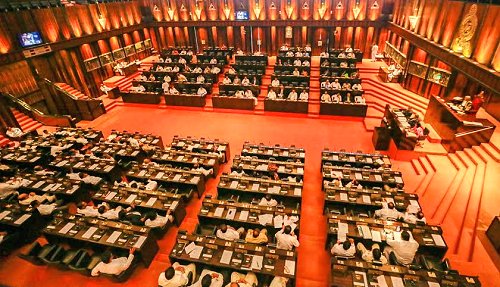Sri Lankan Parliament impeaches CJ
R.K.RADHAKRISHNAN
Motion passed with 155 MPs voting in favour

R.K.RADHAKRISHNAN
Motion passed with 155 MPs voting in favour

The Sri Lankan Parliament impeached Chief Justice Shirani Bandaranayake on Friday, throwing the judiciary into disarray and signalling a breakdown of the Constitution.
A host of procedural issues delayed the debate on Thursday, and the vote on Friday. But Speaker Chamal Rajapaksa, a brother of President Mahinda Rajapaksa, allowed the vote to go ahead late on Friday. He later announced that the President would be informed that the impeachment motion was passed with 155 votes for and 49 against.
Despite the impeachment, Ms. Bandaranayake is still some distance away from being thrown out. The President has to make a formal proclamation to this effect; and he has said he would first consult a panel of eminent persons ahead of taking such a decision. Also, since the Parliamentary Standing Committee (PSC) report itself is void, the judiciary cannot accept the impeachment. In effect, Ms. Bandaranayake can continue as CJ till the executive implements the orders of the legislature.
PSC report
The PSC report, on which the impeachment motion was debated, had probed allegations of misconduct by the top judge and was earlier quashed by The Court of Appeal. Parliament, nevertheless, went ahead with the debate. “Is this Parliament to say, ‘We can read the Constitution. Article 125 says it is the sole and exclusive jurisdiction of the Supreme Court to interpret the Constitution, but we don’t agree with that. Because we don’t agree with that, we don’t accept that’?” asked M.A.Sumanthiran, an opposition MP. The stand of his party, the Tamil National Alliance (TNA), is that the report on which the entire debate is based, does not exist.
After a two-day debate, which saw charges and counter-charges being levelled on a host of issues, Parliament voted on the motion moved by the Leader of the House, Nimal Siripala de Silva. And there were no surprises.
In Sri Lanka, the Speaker can entertain a motion of impeachment against a sitting Chief Justice if demanded by one-third of the 225 members. The motion is required to be passed by a simple majority —113 votes. In Ms. Bandaranayake’s case, as many as 117 MPs had signed the impeachment motion and handed it over to the Speaker.
A group of senior lawyers have written to Supreme Court judges, asking them not to accept a new Chief Justice to protect the independence of the judiciary. “The attempt to remove the Chief Justice from office is without any legal basis and contrary to the Constitution and the law of the land,” said the Lawyers Collective in theletter.
“As you are well aware you are obliged [as are we] to honour and follow the decisions of our courts whether we agree with it or not. Thus disagreements in other quarters is irrelevant,” it added.
The Centre for Policy Alternatives, a think tank, said the “unnecessary and regrettable move by the legislature today has deeply debilitating consequences for constitutional governance”.
The U.S., the first country to react, said it was deeply concerned by the proceedings which were conducted in defiance of a Supreme Court order.
Separation of powers
“This impeachment calls into question issues about the separation of powers in Sri Lanka and the impact of its absence on democratic institutions,” a release said.
“With this the rule of law system in Sri Lanka comes to an end,” said Asian Human Rights Commission, a Hong Kong based NGO. “This is the culmination of the scheme of the 1978 Constitution which is a constitution, not of a democracy, but of a dictatorship,” it added.

